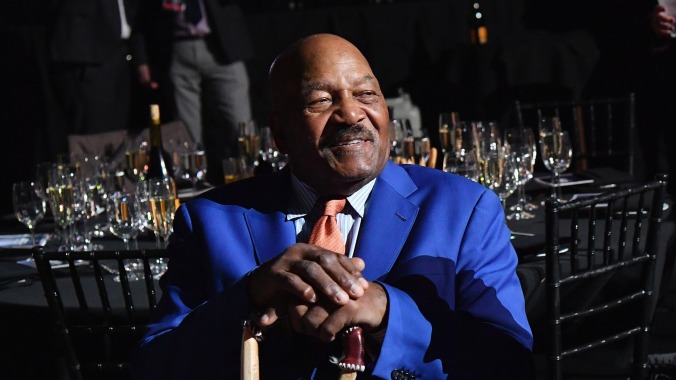R.I.P. Jim Brown, legendary running back, actor, and activist
Although his legacy was clouded by legal issues, Brown was one of the most dominant athletes (and frequent actors and action stars) of his generation

Jim Brown has died. One of the most successful professional athletes in American history, Brown’s off-field career was in some ways even more varied and colorful than his record-setting time in the NFL: As an actor, activist, and, on one occasion, a nude Playgirl model, Brown was a hugely dominant force in America in the 1950s, ’60s, and beyond. Per Variety, Brown died on Thursday in Los Angeles; he was 87.
Born in the 1930s in Georgia, before moving with his family to Long Island a few years later, Brown first gained national prominence during a college football career at Syracuse. College was also where he most prominently displayed his talents as a multi-disciplinary athlete: In addition to his football duties, which put him in the running for the Heisman, Brown was also a star of the school’s basketball team, track team, and especially its lacrosse team. Once calling it “probably the best sport I ever played,” Brown was the first Black man to ever be inducted into America’s National Lacrosse Hall Of Fame.
But it was football where Brown became a national sensation, serving as a fullback for the Cleveland Browns from 1957 through 1965—including a single championship season in 1964. In that time, he was named to the Pro-Bowl nine consecutive times, named NFL MVP thrice, and set the league rushing yards record eight years out of the nine he played.
As his career in football began to wind down, Brown took up a career in acting, starting with an appearance in Gordon Douglas’ Rio Conchos in 1964. A year later, he appeared in World War II pic The Dirty Dozen, having apparently fully caught the acting bug by this point. (Delays on the film led to the Browns issuing an ultimatum demanding Brown return for training for the 1965 season; he instead announced his retirement from the sport.) Ultimately, Brown would appear in more than 50 movies and episodes of television over the next 50 years, often with a focus on gritty action roles. He appeared in everything from a starring role opposite Raquel Welch in 100 Rifles, to a turn as the murderous Fireball in Arnold Schwarzenegger’s The Running Man, to a performance in Tim Burton’s Mars Attacks!, to his final film role, as himself, in 2014's Draft Day. He also, briefly, got into the world of film production with his old friend Richard Pryor; the duo’s collaboration, Indigo Productions, produced only a single film before tensions between the two men led to its dissolution.
Meanwhile, Brown also used his clout in service of activism, acting as a vocal proponent of the civil rights movement, and he was famously part of the “Cleveland Summit” of several prominent athletes—including Mohammad Ali and Kareem Abdul-Jabbar—to discuss how to use their platforms to advance the cause of civil rights. In later years, Brown also launched projects designed to support minority-owned businesses, and to help former gang members develop new life skills.
Brown’s legacy is complicated, though, by a long history of legal issues, often related to allegations of violence against women. Although most charges against him were eventually dropped (or not pressed at all, on some occasions), on multiple occasions throughout his life, Brown was accused of assault and battery, frequently against his romantic partners. Perhaps most notably, Brown was accused by his second wife, Monique Brown, of smashing her car with a shovel and threatening her in 1999. Brown ultimately served three months in jail over failure to comply with his community service sentencing in the ensuing trial; Monique Brown later recanted her testimony, and the pair remained married until his death this week.